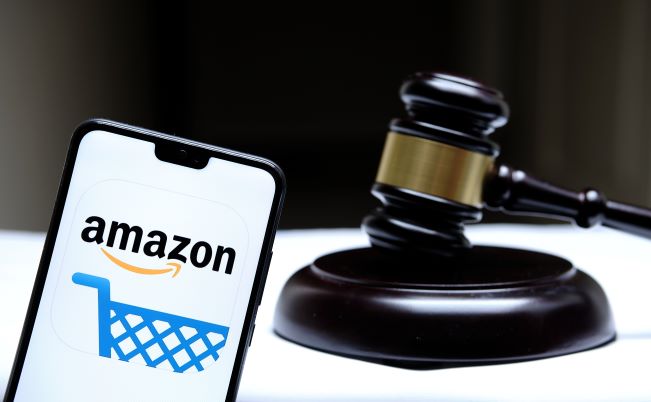Amazon recently confirmed that the ban on more than 3,000 Chinese retailers and 600 brands is permanent. Amazon recently took action against thousands of sellers and froze their inventory because the sellers had paid for good reviews of their product.
In 2016, Chinese vendors made up just 13% of Amazon online accounts. Today, the “Made in China sold on Amazon” community accounts for more than 50% of Amazon sales.
The big question remains will the expulsion of the sellers have a long-term effect on the growth of the platform?
Amazon suspends thousands
Amazon took the first steps in suspending sellers in April 2021. The initial casualties were electronic giants Mpow and Aukey. According to a report in the Global Times, more than 50,000 Chinese seller accounts followed.
It is estimated that Amazon has lost around $15.4 million in trade. Sounds like an own goal, but other sellers will soon pick up the trade from left by the Chinese sellers.
Amazon suspended the sellers for rewarding buyers for favourable reviews. In China, it is common practice to pay people for giving products good reviews, but Western countries frown on such behaviour.
Amazon deleted more than 200 million reviews following the suspension.
The upshot
When Amazon bans a seller, they freeze their stock. You can’t sell any of it and you have to pay Amazon to release it. If you choose not to reclaim your goods, you’ll still have to pay Amazon for disposal of the assets.
The freezing of stocks left suspended sellers with no stock to sell. These sellers have employees and creditors who expect payment. The immediate loss of business cost many their jobs. Though some of the sellers have set up their own websites, they are unlikely to immediately recover the high-volume Amazon traffic that they’re use to.
Shenzhen Qianhai Patozon Network & Technology Co, owner of the Mpow brand fell hard. It reacted by suspending its R&D team and cutting staff.
Another Amazon casualty, Weiweima, in a WeChat layoff notice claimed that the company made 95% of its revenue from Amazon sales. That’s huge when you consider that the company made $8.5 million in revenue each year.
We wonder how the suspensions will affect the due diligence of Amazon aggregators who are considering the acquisition of Chinese sellers.
Amazon reviews
One of the few online buyers judge the quality of products before they buy is to study buyer reviews. They value this information since it helps them to determine whether the product is fit for use.
Sellers also appreciate good reviews because they help product listings to rise up the Amazon ranks. Highly ranked products get more traffic and earn more sales and revenue.
Amazon wants sellers to get good reviews through excellent quality and customer service. Yet, some sellers have flouted the Amazon rules and chosen to buy reviews. In China, many businessmen and women consider review buying a sound marketing practice. Some of the suspended companies did, in fact, sell quality products. So why the need to buy reviews?
In China, businesses typically outsource product review management. These service providers are adept at hiding product review origins thus eluding the Amazon algorithms that track such information.
These service providers will often re-direct Amazon visitors to other websites. Here, they acquire the email addresses of the visitors. Then they use these email addresses to request positive product reviews.
Review problems extend beyond the loss of trust that false good reviews can cause. Bloomberg Businessweek reports that some US sellers believe that others also manipulate Amazon rankings using negative reviews. They claim that when their listings start to rise up the Amazon ranks, they suddenly face a barrage of negative reviews, bringing their products right down the ranks again.
A few years ago, Amazon permitted the use of incentivized reviews. In 2016, they realized that this process threatened the integrity of the review system. So, they changed the rules of engagement. Amazon sellers may now ask for a review, but they can’t request a good rating. They are also prohibited from offering any incentive for positive reviews.
What’s behind the Amazon suspensions?
Manipulation of reviews has been around for some time. Why has Amazon not taken action earlier? What prompted this sudden but decisive action?
Any number of events may have provoked the suspensions.
In March 2021, Safety Detectives exposed data showing that thousands of Amazon sellers and customers had interacted. The database revealed customers had written fake and incentivized reviews.
Amazon sellers, mostly Chinese, triggered reviews by sending a list of products requiring 5-star reviews to potential takers. The willing customer would then purchase the item and give it a good review. Once that was done, the customer would provide the seller with banking details. Then the seller would refund the cost of the product. So, in effect, the reviewer would get the reviewed product for nothing.
The discovered database resides on a server in China.
Any big business strives to protect their reputation. Reputational damage has the potential to drive away sales. Fake reviews could damage Amazon’s good standing, so they had to do something about them.
Pressure from the authorities
The Federal Trade Commission have applied increasing pressure on Amazon to take action against sellers who manipulate reviews. Internal communication between employee as reported in Recode report showed this to be the case.
The pressure didn’t stop in the US. In the United Kingdom, the Competition and Markets Authority has also applied pressure on Amazon to cut the fake reviews.
So, it seems the powers that be have decided to compel online platforms to enforce their terms of use.

How do these suspensions affect Amazon sellers?
Up to now, many sellers have thought that Amazon would take no action against big sellers because it would cost them dearly. What business would suspend their biggest revenue earners? With this in mind, some sellers may have been a little lax about fake reviews.
The suspension of some of the biggest brands on Amazon, leaves no doubt that Amazon will enforce the terms of use. As a result, Amazon sellers may take more care to ensure that their Amazon accounts remain healthy.
The suspension of the Chinese brands has left a large amount of Amazon real estate up for grabs. Those sellers with the stock and the marketing savvy should take this opportunity to grow their brands.
About the author
This is a post by Emilie, at Margin Business, an Amazon service provider helping Amazon sellers not only to translate their listings but also to optimize them with localised copywriting, photos and more.
If you are looking to boost your Amazon sales and rank within Amazon TOS, MarginBusiness can help you. To learn more, please don’t hesitate to get in touch with one of our specialists and get your listing Analysis for Free! Don’t forget to mention My Amazon Guy!
If you sell on Amazon, never have a “Set it and Forget it.” strategy.









